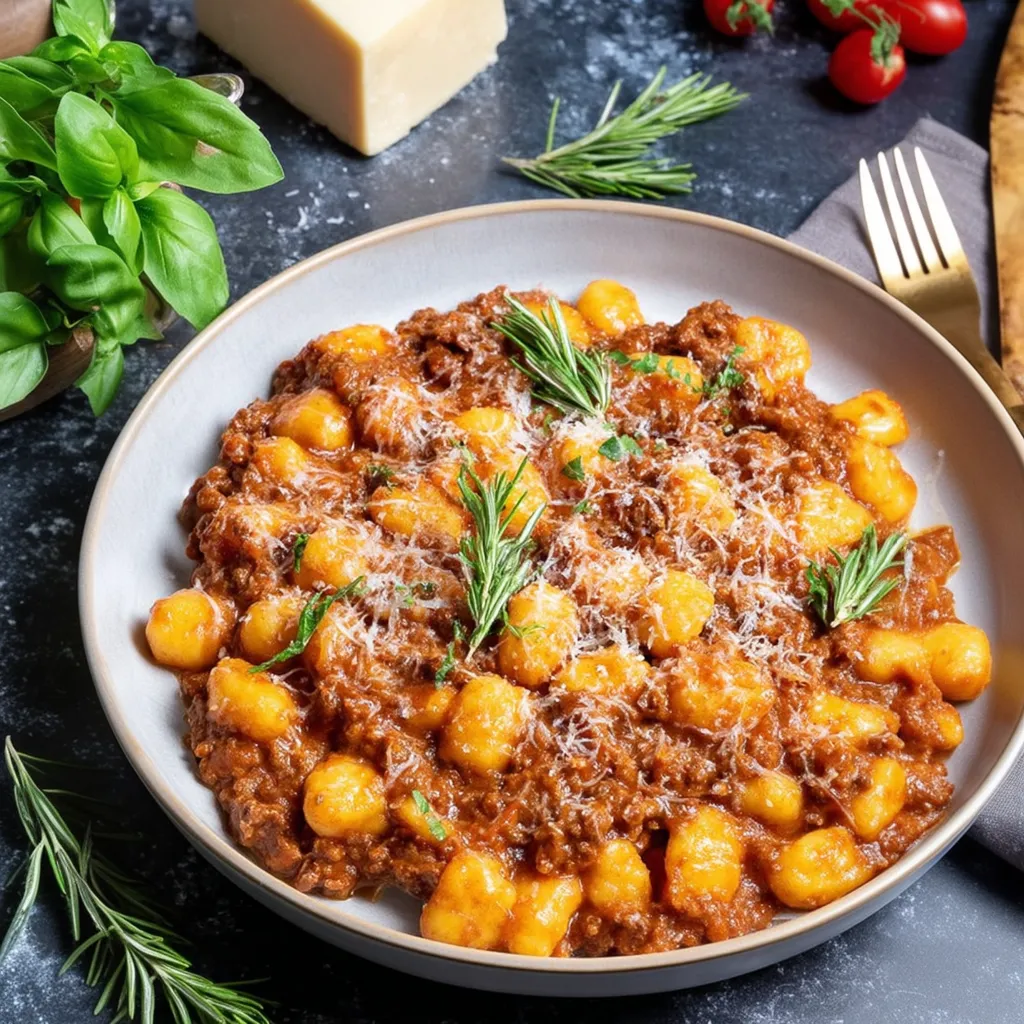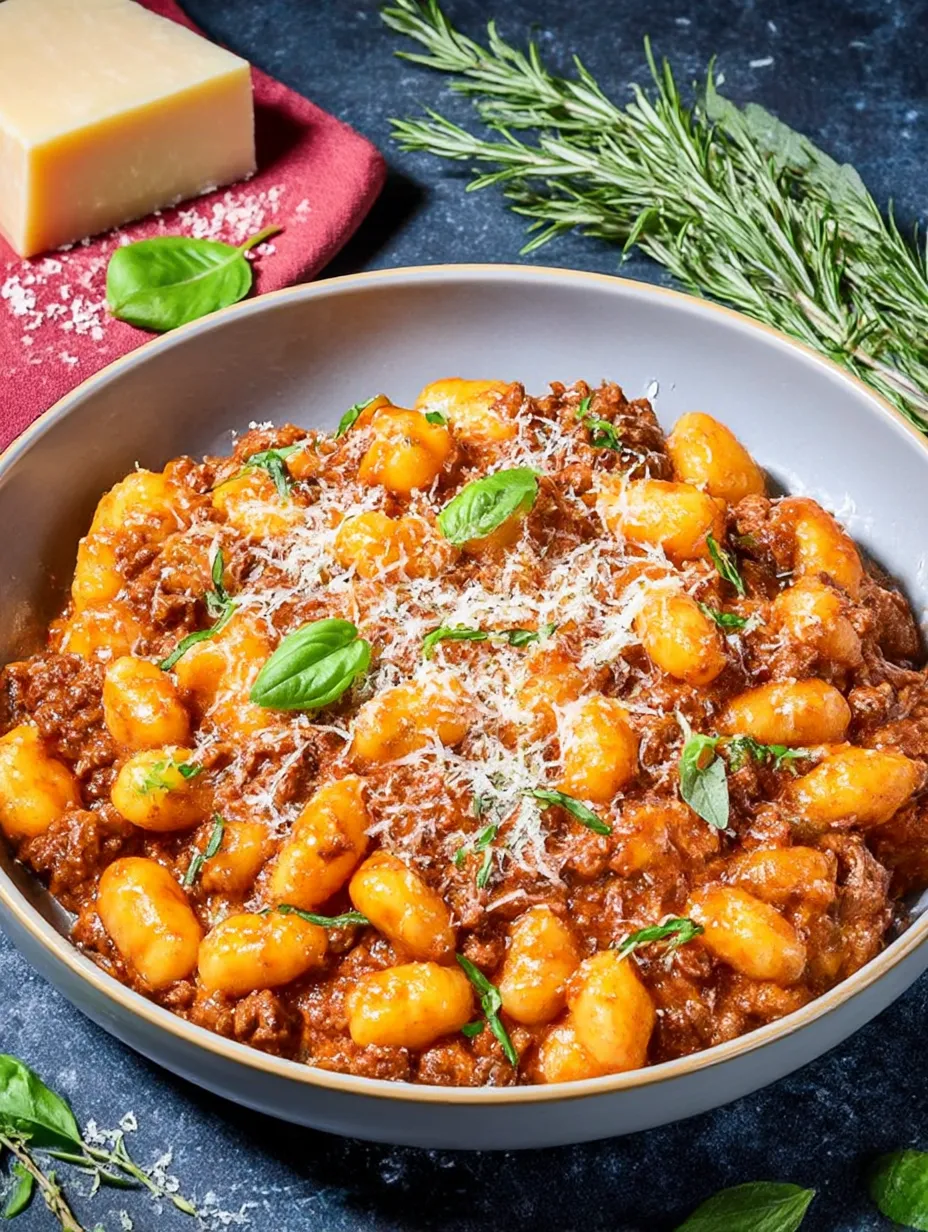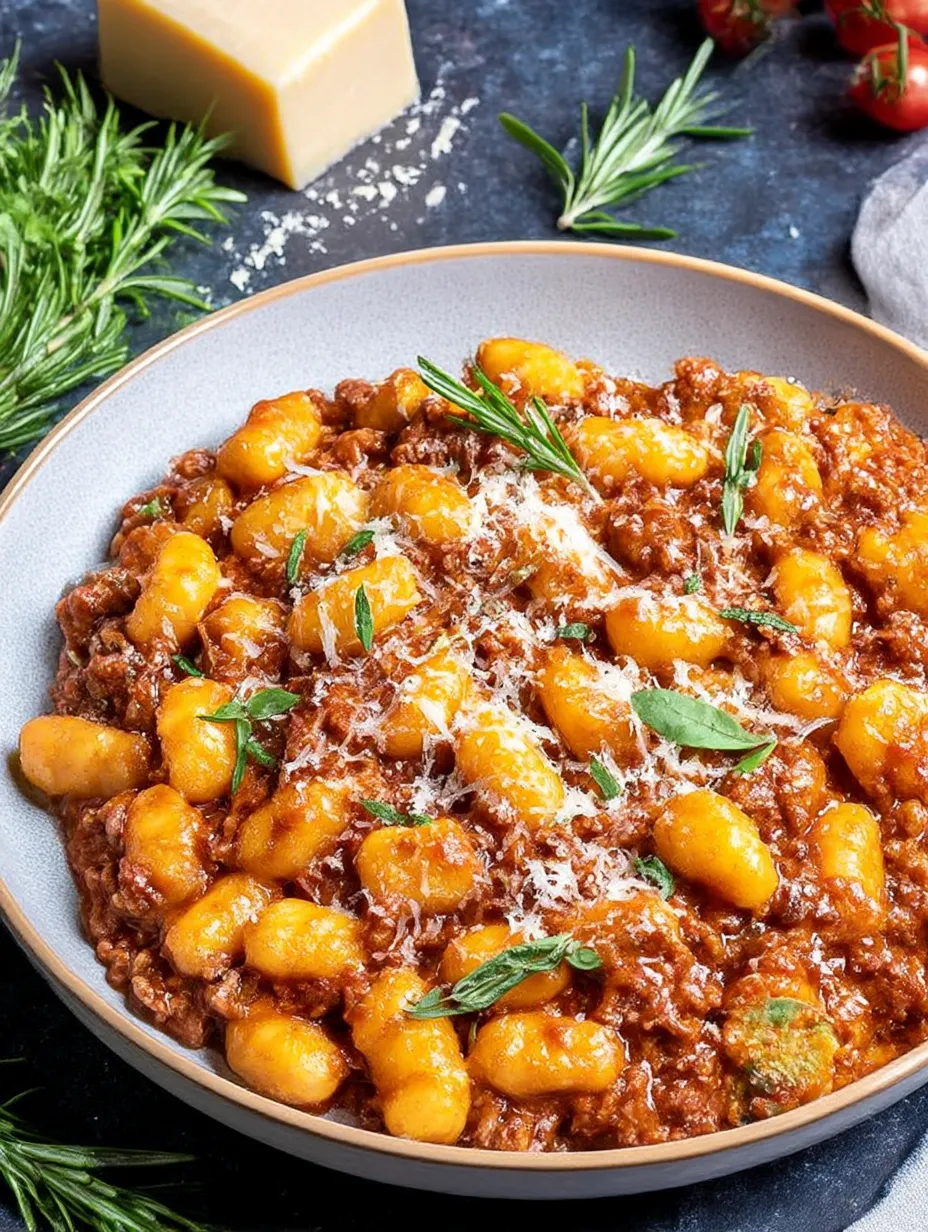 Pin it
Pin it
This homemade gnocchi bolognese combines pillowy potato dumplings with a rich, slow-simmered meat sauce that transforms simple ingredients into something truly magnificent. After years of experimenting with different pasta dishes, this recipe has become my go-to when I want to impress without spending hours in the kitchen.
I first created this recipe when my Italian neighbor shared her family's bolognese secret of adding finely diced vegetables. The first time I paired it with gnocchi instead of regular pasta, my husband declared it the best comfort food I'd ever made.
Ingredients
- Olive oil: selected for its fruity notes that complement tomatoes
- Onion, carrot, celery: the classic Italian soffritto that builds deep flavor
- Garlic: fresh cloves provide aromatic punch that powdered versions cannot match
- Lean ground beef: use 85% lean for best flavor without excess grease
- Dry red wine: adds complexity and acidity, choose something you would drink
- Tomato paste: concentrated flavor that thickens and enriches the sauce
- Fresh herbs: thyme and rosemary elevate the sauce with aromatic notes
- Red chili flakes: just enough for warming depth without overwhelming heat
- Crushed tomatoes: San Marzano variety if possible for sweet balanced flavor
- Beef stock: adds richness that water simply cannot provide
- Bay leaves: infuse subtle earthy notes during simmering
- Store-bought gnocchi: saves time without sacrificing quality
- Parmesan: freshly grated from a block for proper melting and flavor
- Fresh basil: adds bright finishing notes that dried cannot replicate
Step-by-Step Instructions
- Create the Soffritto:
- Heat olive oil in a large Dutch oven over medium heat until shimmering but not smoking. Add the finely diced onion, carrot, and celery, stirring occasionally for 8-10 minutes. This slow cooking process caramelizes the vegetables slightly, creating a sweet foundation for your sauce. The vegetables should soften completely but not brown too much.
- Brown the Aromatics and Beef:
- Add garlic and stir constantly for one minute until fragrant but not browned. Immediately add ground beef, breaking it apart with a wooden spoon into small crumbles. Cook until no pink remains, about 5-6 minutes. The meat should develop some caramelized bits on the bottom of the pan these are flavor treasures.
- Deglaze with Wine:
- Pour in the red wine, stirring vigorously and scraping up any browned bits from the bottom of the pan. Allow the mixture to simmer until the sharp alcohol smell dissipates and the liquid reduces by half, approximately 1-2 minutes. The sauce should take on a beautiful reddish-purple hue.
- Build the Sauce Base:
- Add tomato paste and stir continuously for about 2 minutes until it darkens slightly and coats the meat. This brief caramelization enhances the tomato flavor. Sprinkle in fresh thyme, rosemary, and red pepper flakes, stirring to release their aromatic oils into the fat.
- Simmer to Perfection:
- Pour in crushed tomatoes and beef stock, then add bay leaves. Bring the mixture to a gentle boil before reducing to a simmer. Cook uncovered for 15 minutes, stirring occasionally. The sauce should thicken enough to coat the back of a spoon but remain silky and pourable.
- Cook the Gnocchi:
- While the sauce simmers, bring 4 quarts of water to a rolling boil in a large pot. Add 1 tablespoon of salt once boiling, then add gnocchi. Cook according to package directions, usually 2-3 minutes. The gnocchi are done when they float to the surface. Avoid overcooking or they will become mushy.
- Combine and Finish:
- Drain gnocchi but do not rinse. Immediately add them to the thickened sauce along with Parmesan cheese and torn basil leaves. Gently fold everything together until the gnocchi are evenly coated. The starch from the gnocchi will help thicken the sauce further and create a silky texture that clings to each dumpling.
 Pin it
Pin it
The secret to this bolognese lies in the soffritto. My grandmother always spent extra time on this step, dicing the vegetables uniformly and cooking them slowly. When I rush this step, the sauce never tastes quite the same. Those first 10 minutes create the foundation that makes this sauce so memorable.
Make-Ahead Options
This bolognese sauce actually improves with time. Make it up to three days ahead, stopping before adding the gnocchi. Store in an airtight container in the refrigerator, then reheat gently on the stovetop while you cook fresh gnocchi. The flavors will meld and deepen during storage, creating an even more flavorful finished dish with minimal effort on serving day.
 Pin it
Pin it
Vegetarian Alternative
For a meatless version that still satisfies, substitute the ground beef with a mixture of finely chopped mushrooms and crumbled tempeh or plant-based ground. The mushrooms provide umami depth while the tempeh adds protein and texture. Use vegetable stock instead of beef stock and add an extra tablespoon of tomato paste for richness. The key is chopping the mushrooms very finely so they integrate into the sauce similarly to ground meat.
Wine Pairing Suggestions
This hearty gnocchi bolognese pairs beautifully with medium-bodied red wines that have good acidity to cut through the richness of the sauce. A Chianti Classico from Tuscany makes a traditional Italian pairing, while a Barbera from Piedmont offers bright cherry notes that complement the tomato. If you prefer something non-Italian, try a Grenache blend from the southern Rhône, which brings warm spice notes that enhance the herbs in the sauce.
Frequently Asked Questions
- → Can I use store-bought gnocchi?
Yes, store-bought gnocchi is perfectly suitable for this dish. It’s quick and convenient, making it ideal for weeknight meals.
- → What wine works best for the sauce?
Dry red wines like Cabernet Sauvignon, Merlot, or Chianti pair beautifully with the flavors of the rich tomato sauce.
- → Can I make the sauce ahead of time?
Absolutely! The sauce can be prepared a day in advance. Store it in an airtight container in the fridge, and reheat it before combining with the gnocchi.
- → What can I substitute for beef stock?
You can use chicken or vegetable stock as a substitute, though beef stock provides a deeper, richer flavor.
- → What other herbs can I add?
Fresh oregano or parsley can be great additions to complement the thyme and rosemary in the sauce.
